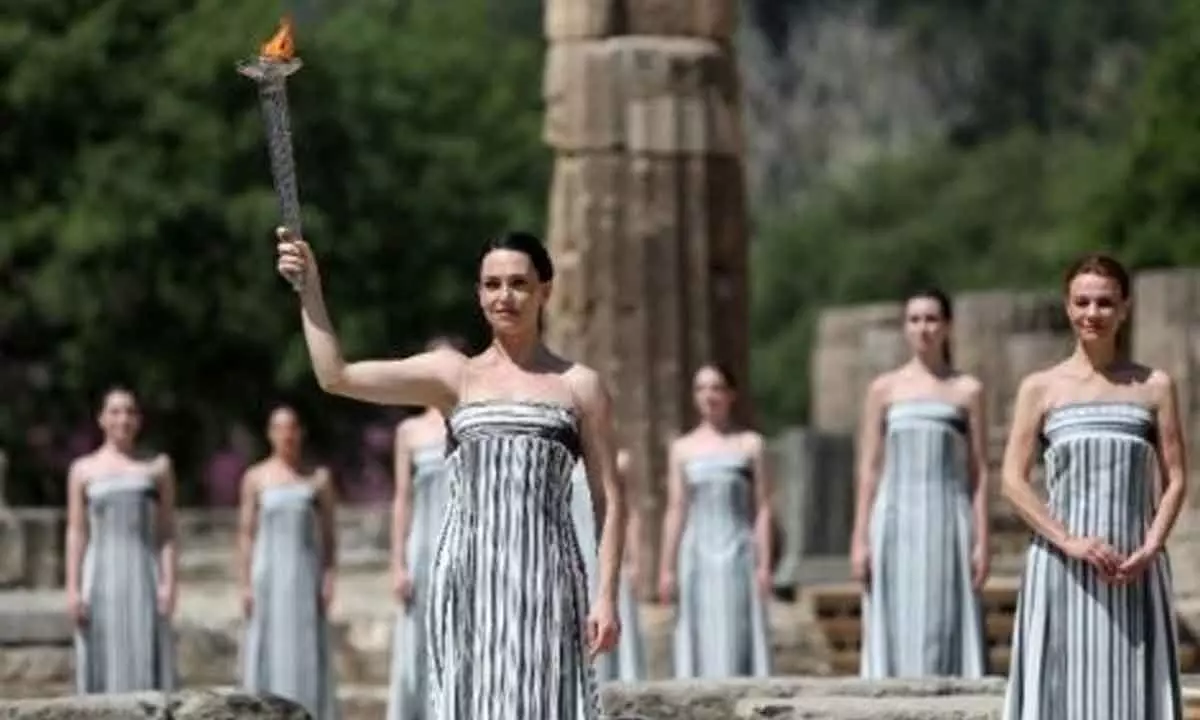Olympic Flame for Paris 2024 lit in ancient Olympia

In a choreographed event high in symbolism inspired by the traditions and values of ancient Greece, actresses dressed as ancient priestesses entered the stadium to gracefully accompany the head priestess to the Temple of Hera, where religious ceremonies are thought to have taken place in ancient Greece and where the lighting ceremony is held
Olympia (Greece): The flame for the 2024 Paris Olympics has been lit in Olympia, the birthplace of the ancient Olympics. The flame will now begin its journey in a relay to light the cauldron that will mark the opening for the Summer Games in July.
Dignitaries and members of the public gathered in the stadium, where the earliest recorded Games were held in 776 BC, to witness the lighting of the flame.
In a choreographed event high in symbolism inspired by the traditions and values of ancient Greece, actresses dressed as ancient priestesses entered the stadium to gracefully accompany the head priestess to the Temple of Hera, where religious ceremonies are thought to have taken place in ancient Greece and where the lighting ceremony is held. Asking for the help of the God of Light, Apollo, the head priestess lit the flame with the help of the rays of the sun, holding a fuel-filled torch to a parabolic mirror.
The first such choreographed ritual was first established for the 1936 Berlin Games with the costumes and torch designs capturing the minds of creatives.
In Ancient Olympia, home of the ancient Olympics for more than 1,000 years, a flame was thought to burn perpetually on a shrine, symbolizing the eternal spirit of the Games: The enduring pursuit of excellence and human unity. The first runner of the Olympic torch relay is Greek Olympic gold medalist rower Stefanos Ntouskos. Ntouskos has described being the first torchbearer as “a great honor.” “As a Greek, I have been raised with images of the relay and it is incredible to be here in ancient Olympia today and to be receiving a flame that will travel all the way to the Paris Olympics,” he added.
Ntouskos said he was a little bit anxious ahead of competing at Paris 2024 but also very excited. “I have done many races and I know how difficult it is, but I believe I will have some great moments there,” he said.
The first part of the relay is a 5,000-km journey across Greece over 11 days, with over 600 torchbearers from elite athletes to members of the public are expected to take part.
The finishing line is the Panathenaic Stadium in the heart of Athens – the historic site of the inaugural modern Olympics in 1896 – where, in a handover ceremony on April 26, the flame will be passed to the Paris Olympic organizers.
It will then embark to the French port city of Marseille on the 120-year-old, three-masted Belem, a historic vessel that began life as a cargo ship transporting sugar from the West Indies. It is expected to arrive in France on May 8, where the next leg of the relay will begin.
Over the years, the torch has been carried by hundreds of thousands of people. In this journey, it is expected to be passed from hand to hand by some 10,000 torchbearers and reach the Olympic cauldron in Paris on July 26, where it will remain lit until the Closing Ceremony two weeks later.
The flame will also light the Paralympic Games, which take place August 28 to September 8, where 1,000 torchbearers will help relay the torch across 50 French towns and cities.
In an interview Monday, French President Emmanuel Macron said, due to security concerns, a Plan B is being explored that could see the ceremony moved to a stadium instead. He also spoke about his intentions to promote the ideals of the Olympic Truce.








